
Julio Valdivia Silva
Chair of Bioengineering Department
jvaldivias@utec.edu.pe
Biography
Research areas
Teaching experience
Papers
Professional profile
Medical- Surgeon (Physician-Surgeon) of the San Agustín National University, Arequipa Peru. Doctorates in Biological Sciences at the Institute of Nuclear Sciences of UNAM-Mexico with the Astrobiology Program of NASA - Ames Research Center USA, and in Biomedical Sciences at the Institute of Biomedical Research -UNAM. Postdoctoral stays at the Cancer Stem Cell Research Lab - U. Stanford CA-USA, in the Division of Planetary Sciences and Astrobiology of NASA Ames Research Center Moffett Field CA-USA, in the GSP10 program of Singularity University CA, USA, and in the Institute for Biomedical Research, UNAM in direct collaboration with the National Cancer Institute-Mexico. He was Associate Researcher at INICTEL-UNI, Peru thanks to the repatriation program of Peruvian researchers abroad of INNOVATE Peru, Ministry of Production that brought him to Peru in 2015. He has been Associate Researcher with NASA's SETI Institute until 2018 and currently He is Director of Bioengineering and the Bioengineering Research Center -BIO at the University of Engineering and Technology - UTEC. Winner of the Pfizer Innovation Award for his cancer research and awarded an Honorary Doctorate from the National University of San Agustín de Arequipa. He is Adjunct Staff at the Lerner Research Institute of the Cleveland Clinic and founding President of the Scientific Astrobiology Society of Peru.Work positions
- Chair of Bioengineering Department
- Director of the BIO Research center
- Full-time professor - Bioengineering Department
Research areas
- Life support systems (space biology, astrobiology)
- Extremophiles and extreme environments
- Cancer
- Immunology (oncology)
- Regeneration of tissues and stem cells
- Synthetic biology
- Microdevices
- Labs on a chip
Courses
- Introduction to Bioengineering: The course, of a theoretical nature, has the main objective of showing the student the multidisciplinary profile of Bioengineering in a panoramic way, so that they can identify the most important components, which will be treated in the courses throughout of his years of study. The course shows the wide variety of fields of action of bioengineering, for those who have specialization preferences in areas of biomedical or biotechnology
- Physiology and Pathophysiology: The course is theoretical in nature and has the purpose of providing structured, sequenced and updated information on the functioning of organs and systems as a whole, during health and illness. This information seeks for the student to generate a model of interaction between molecules, cells, tissues, organs and systems, which will make it possible to relate structure to function, interpret physiological data in balance and help predict changes in the body. before specific alterations.
Publications
- Development of an accessible and low-cost micro-fluidic system (lab-on-a-chip) for detecting circulating breast cancer tumor cells.
Link
- Guillain–Barre syndrome outbreak in Peru: Association with polymorphisms in IL‐17, ICAM1, and CD1.
Link
- New approaches in the pathogenesis of pressure ulcers, Novedades en la patogenia de las úlceras por presión. Link
- Extreme salinity as a challenge to grow potatoes under Mars-like soil conditions: targeting promising genotypes. Link

